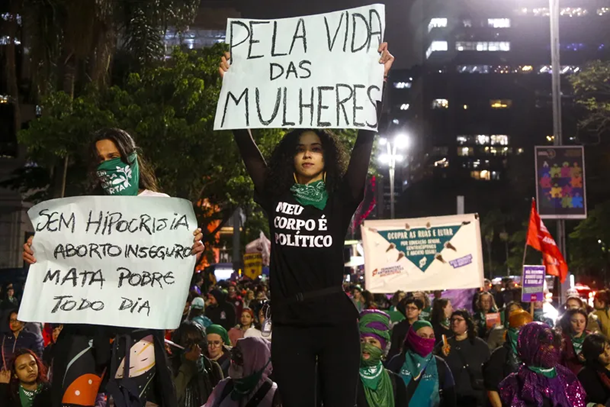Rafael Munia
The first article I wrote as editor-in-chief of The Advocate was centered on the organizing women were doing around East Asia. Now, after having worked at the head of our student newspaper for nearly half a decade, it seems proper that the last article I write while holding this position should also be centered on women’s organizing, this time with a focus on Brazil.
After 2022, when Brazilians were celebrating Bolsonaro’s loss at the election and the return of Lula to his 3rd mandate, a naïve hope emerged that the country would finally be done with the agenda of fascism and finally return to a more rational and humane approach to politics. However, sadly the word return here is crucial. For anyone in America, the idea of a return to normal may be an equally familiar point raised over and over again during the Trump v. Biden elections (the first one that is). I am old enough to remember the surprising shock that was Lula’s first victory for the presidency in Brazil. In 2002, Lula won an election where Social Democrat candidate Jose Serra, Labour Democrat candidate Anthony Garotinho, and Popular Socialist candidate Ciro Gomes, all presented a left platform for the presidency as the four main candidates. Still, Lula appeared as the Left of the Left candidate, with criticism usually directed at his Utopic promises and the daydreaming nature of his voters, derided as naïve and wishful thinkers.
In 2022, nobody could accuse Lula and his candidacy of being Utopic or full of promises for change. His campaign instead centered on a nostalgia for the Lula years, and how Lula was the only one who knew how to bring those good years back. Yes, Lula ran against Bolsonaro essentially under the banner “Make Brazil Great Again”. Still, the opposition to Bolsonaro made it so that his conservative campaign was perceived as the only way for the left to vote. Most of the opposing left parties decided instead to join in alliance with Lula. Online campaigns gained a surreal nature as feminist influencers found themselves fact-checking accusations against Lula, certifying that it was a lie by the opposition that Lula was pro-abortion or inclusive toilets. Yes, 2022 saw Feminist influencers arguing that we should vote for Lula because he was AGAINST abortion and gender-inclusive policies.
The thing is, they at least were not lying. As people in America celebrated a leftist victory in Brazil restoring democracy and defeating fascism, while wearing their Lula Livre shirts, Lula proceeded to oversee the most conservative agenda in Congress since re-democratization in 1989. Yes, you read that right, the agenda being discussed in Lula’s congress is far more conservative than the one during the four years Bolsonaro was in office.
At the center of this, is a new bill that proposes to not only eliminate the right to abortion in case of rape but to criminally prosecute the woman or girl who performed the abortion for the crime of homicide, up to 20 years. It adds to the perversity of the bill that the crime of rape itself is not prosecuted as homicide and has a maximum penalty of 10 years. Therefore, the new bill created a situation where a grandfather that raped his 10-year-old niece (a real case that occurred a few years later to national commotion), would get away from jail in half the time she spent in jail for getting an abortion.
You might think that, given the sadistic and absurd hue of this bill, it would be easy for the leftist government in power to openly oppose this unpopular bill. Yet, all we got was Lula coming out to declare that he too was against abortion, but that he only opposed the bill because he thought the current abortion law was already good enough. Many other members of his party followed suit. The general tone that mainstream opponents of the bill used was not a pro-abortion one, but instead, one in which this abortion bill was just a distraction to get people to not pay attention to the REAL politics going on. Politics that, contrary to abortion, impacted EVERYONE (in other words, not ONLY women).
Now, as I write this I have hope that the reader would leave a sneer of derision as she thinks “Wow, that’s stupid…”, but then again I am reminded of how CUNY tried to organize for Abortion Rights as well and the number of people showing up was depressing. Even when women at CUNY organized a protest against a professor in the philosophy department who was under investigation for raping a student, asking for him to be fired, as CUNY maintained him actively teaching and putting other students in danger, that too had very few, albeit determined and fierce, attendants.
New students who see the success of pro-Palestine organizing may have developed a good impression of CUNY’s political environment, one that I hope serves to keep the positive cycle going until it becomes a powerful social reality. Yet, I also remember that the first time I saw a copy of The Advocate around, was when the big debate on campus was the infamous “7K or Strike”. As students campaigned to pressure Albany for a better contract for student-workers, one that would give us a living wage in NYC, the contract ended up being far below 7K. So, as we were told to vote No on the contract and prepare for Strike, the Yes passed with more than 70% of the votes, and we never did that strike (and continue not to, up to this day). Now, we find ourselves back into another negotiation, having spent some time without a new contract already, wondering if the same vigor students demonstrated towards Palestine will translate into the kind of wages and stability that would allow students to be more politically active and effective.
In 2002, when Lula was still in his first term as president, several former allies decided to split from the government for what they considered to be a betrayal of the left popular agenda that had elected him. PSOL, the Socialism and Freedom Party, was formed by members of Lula’s Worker’s Party who were disappointed at Lula becoming just another Clinton/Blair figure. Lula’s environmental minister, Marinna Silva, left the government to join the Green Party and then later founded her own party: Sustainability Network. His Education Minister, Cristovam Buarque, moved to the Labour Democratic Party and ran against Lula in the next election. However, in 2022, PSOL is the party most aligned with Lula’s PT, Marinna is back as Lula’s environmental ministry, and the only figure that remained opposing Lula was Buarque, but that’s only because he has moved further and further right with each election cycle. To top that up, social movements like the Landless Movement and the Homeless Movement, have all been coopted by the government, so that without any Agrarian Reform or Public Housing Program, both movements have refrained from making any significant anti-government demonstration.
A few issues ago, one of our dear frequent contributors Britt Munro wrote an essay in defense of building coalitions as a political strategy. Ironic that the article in question was written about the Abortion Rights issue. Yet, the number of people that show up to protest for Abortion Rights in CUNY, when juxtaposed with how members of the Brazilian left dismissed the possible loss of the little Abortion Rights in Brazil as just a distraction and something that didn’t affect everyone, but just women, truly makes me reconsider the strategy of coalition and its efficacy. In fact, if history has taught us anything is that the feminist movement has met its most significant victories when centering themselves in their struggle, and has had most of its betrayals precisely when finding itself in coalitions where women’s issues are always subsumed as a secondary afterthought, when not the subject of the claim that it is a divisive issue on the left.
Here I want to go back to the case I mentioned earlier in this piece, about the 10-year-old girl who had to look for an abortion clinic after being raped by her own grandfather. Although the legal code allows girls to have abortions in case of rape, the opposition to her abortion moved the conservative forces in Brazil to not only the usual grassroots acts of sending death threats to potential doctors but even judges who were passing injunctions to keep her from being able to access her right. It was only when a feminist collective in Brazil, called SANGRA, mobilized in person to cordon off and protect the hospital that would do the procedure on the girl and kept protecting the place until they could be sure that the girl and her mother were safe. It was SANGRA and women only who organized, and took the personal life risk of standing in front of the mob, all while the left parties and movements ignored the issue as either a distraction designed to “fire up idiotic religious conservatives”, or sidestepped it afraid to alienate potential evangelical voters, as is the case with Lula.
When Lula got elected in 2002, his VP candidate was affiliated with the Brazilian Republican Party, also known as the party affiliated with the evangelical Universal Church. The party was important in securing the impeachment of Dilma. Lula invented a new ministry, the Fishery Ministry, and gave it to an evangelical Bishop called Crivella, who admitted to knowing nothing about fishing. Later, he would become mayor of Rio and an anti-Lula force. Dilma had also negotiated with the religious opposition the chair for the Human Rights Commission in Congress, which ended up at the hands of evangelical leader Marco Feliciano, later to become the most-voted congressman in Sao Paulo and a powerful force against progressive and left politics in the country. Lula in his 2022 campaign boasted about being the one who signed the authorization for the “March for Jesus” event, which has been used as a center for conservative and religious opposition to Lula and any progressive politics in the country.
If anything, it would seem that the only result of Lula and his coalitions has been to centralize all the left under his lukewarm progressivism that is too afraid to speak out loud about it, while empowering the very conservatives and religious forces he professes to be the only force capable of opposing. So, pardon me if I am more inspired by SANGRA’s direct action as women came together to defend the rights of autonomy over a fellow girl’s body, rather than by the talk of coalition.
The day we see the fight for women’s rights in such emergency situations like the presence of a rapist in the classroom, the overturning of federal guarantees to reproductive autonomy, or even the former GC president ordering the removal of the Tendenero that displayed student’s stories of survival with sexual assault and abuse, garnering the same prompt participation of all students across the GC, then maybe the idea of building coalitions will make more sense. Until then, to borrow the sentence from Juliana Losso’s poster that has stayed with me at The Advocate office over the years: “Woman, Do Whatever It Takes To Survive!”




